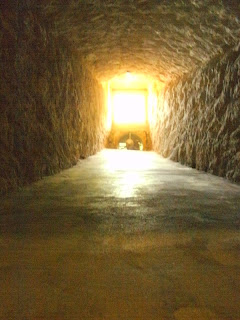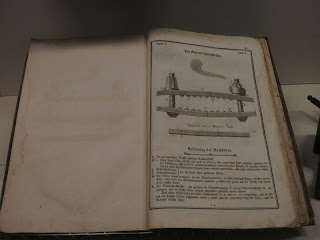This is a pillary. There delinquents were displayed for minor crimes such as mobbing or beguilement or playing bad music or simply being Jewish or widows or knowledgeable women. They had to wear iron shame masks and were locked there in sight of the public.
These are the medieval standard measurements valid exclusively in Rothenburg. Rute (3,85 m), Klafter (1,80 m), Elle (0,59m) and Schuh (0,30 m²).
Must I mention you got put in a pillary if you sold goods with another measure? If some trader from outside wanted to sell his goods, he needed a permit or had to translate his measurements into Rothenburg standard.
To the right in the picture you can see the woman standard measure of Fimbulmyrk village. If you do not put up, you get put in a pillary and have tow wear my underwear as a shame mask.*ggg*
And we went into the dark cellar...
...of torment and pain. Top is a spiked chair. There the inquisitors put delinquents presumed guilty of witchcraft or sorcery. I must emphasize that it was not primarily the Christian church applying these methods, but first and foremostly mundane law institutions. Torture was a legitimate method of investigation.
A rack bench. Delinquents were tied to the winch and stretched until the joints and tendons came asunder. Often, the pain was increased by steel spikes on the rack´s surface.
This is an advisory book for investigators. Especially for sorcery and witchcraft a question catalogue and torture methods were explained thoroughly and in a most detailed manner. What is most terrifying about this is the institutionalization and bureaucracy involved. It made me rethink many opinions I had towards the Nazi regime. The only aspect missing were the gas chambers, and I daresay they would have used them had they´ve been at hand. This is not to say I want to belittle the deeds of the Nazi regime, for nothing like that should happen ever again in Germany at least. But millions of Jews, Arabs, Syrians, Gnosticists, Protestants, witches, wise women, widows, doctors, philosophers, scientists, handicapped persons, the wise, the strong and the meek, were tortured, injured, broken and butchered systematically by the perverts that invented these machines-in the name of God. I feel disgusted about a mankind that uses its intelligence for such perverse implements, and, more so, the manuals for the lackays that carried the mass-murder through. When I read my Bible, I found out that there actually ARE passages in the text that allow to be interpreted that way, e.g:
“If your brother, your mother’s son, or your son or daughter, or the wife you cherish, or your friend who is as your own soul, entice you secretly, saying, ‘Let us go and serve other gods’ (whom neither you nor your fathers have known, of the gods of the peoples who are around you, near you or far from you, from one end of the earth to the other end), you shall not yield to him or listen to him; and your eye shall not pity him, nor shall you spare or conceal him. But you shall surely kill him; your hand shall be first against him to put him to death, and afterwards the hand of all the people” (Deut. 13:6-9).
I do not want to offend Christian belief in any way, and I do not at all want to judge these verses or those many others in the Bible. I respect the belief of Christianity, but in the Old Testament, blood drips from every page, rout and bloodshed and genocide is the very lifeblood that runs through its veins. I can therefore accept that Jesus Christ was seen as a saviour (and to me he still is a great name), giving peace to the Israelites, for they must have been living under a great pressure all of the time, and chance is, they still do. Jesus Christ had sort of a kathartian effect upon Christianity, but even he did not bring peace, but "the sword". Christianity claims to be a religion of peace while the Old Testament at least gives the impression of being more of a book for an ancient wargod. There are, however, moral standards that were a novelty, and these standards could have validity for mankind, if only we would understand.
And yes, the mundane law quite certainly misinterpreted these passages in the late medieval ages. No book has seen more abuse than the Bible or the Koran. But in my opinion, in these misjudgements lie the roots of all the bloodshed, abuse and fascistic mass murder that Europe has seen so far. I have learned in this museum that, however perverse Nazi ideology has been, it was not the first perversion the world has seen in terms of bureaucratized mass murder. Christian church, in the middle ages at least, had not as big a hand in this as some pagans want to make you believe-but clean hands they had not, either.
Another racking implement. Here delinquents were pulled up vertically until the joints gave way.
A window.
A detailed construction sketch of a thumb screw, 19th century.
More torture and fixation implements.
This is a ceremonial judge´s sword. The blade is almost as small as a small-sword´s, and quite thin. it is one-handed. The sword represented the right hand of justice, the force.
A detail of the handle.
The blade. Apologies for the lousy photos, we were not allowed to use a flash, and I fumbled my camera settings...
Another ceremonial judge´s sword. Note the fullers on the blade with an inscription inlaid in gold.
A ceremonial greatsword. I love that ironwork on the hilt!
...and the pommel.
The blade of the sword is over one m long. here I tried to show that the blade thickness is approx. 4 mm at most, gradually tapering towards the tip. This sword would weigh in at a maximum of 1,8 kg all in one, making it a fast and nimble weapon. The blade will be quite flexible at that. So much for the prejudice of medieval swords weighing in up to 10 kg! Also, this will indicate that medieval swordplay would be no laughing matter and no "Erroll Flynn sword ballett" whatsoever.
There were different weapons on display, though. Medieval and early modernity executioner´s swords were constructed quite differently. Beheading a person was not easy, and the executioner only had one blow. Often, he would be executed right on the block if he messed up. Executioners often came from the lowest social backgrounds imagineable and were valued on the same level as swineherds, whores and other untoucheables. The head was severed with a chopping, not a cutting blow. Such a blow needed less skill than a cutting one, but was difficult enough to achieve. So the executioner´s swords slowly evolved into hefty beasts with a very forward balance point and a more rigid blade. The fuller only reaches up one quarter of the blade. The tip often misses completely.
The inscriptions often say: "When I take the sword to hand, I wish the sinner eternal life" or similar religious meanings, or indicate owner- or authorship.
Below is a rather unusual example of an executioner´s sword with a broad half-moon blade, with no inscription, but a stamped half-moon.
This, however, is an executioner´s hatchet. The inscription is the same as common "Wann ich thu mein Beil aufheben, wünsch ich dem Sünder das ewige Leben" (When I take up my hatchet, I wish the sinner eternal life". The hatchet is in an excellent condition. It is presumeably forged in the three-piece technique and modelled after a broadaxe, which was common as a carpenter´s tool, but stamped with a stylized skull with a cross, indicating that it actually was forged for the exclusive use as an executional weapon.
It is interesting that the edge runs at an angle, which might indicate a more cutting motion. The edge grind is convex, the blade is relatively thin.
Other executioner´s weapons simply carried the name of the executioner or the maker.
This is another example of an adapted weapon of warfare of the 30 year confessional war, a so-called "Flamberg" greatsword. As the example before, it has a very light, flexible, swift and nimble blade with a balance point relatively far towards the handle. It could be used either on the long handle or with one hand on the blade behind the secondary hilt (the two spikes on the blade) in a half-sword technique, making it more apt to be used in a melée.
The distinctive form of the edges was a functional design. It served to increase a wound channel. These greatswords were often used to break the ranks of pikeneers and billmen. When the poleweapons were cut down, troops charged into the breach.
Another greatsword adapted as an executioner´s weapon.
How evil is man?
Or better question to be asked: What prey did the mundane judges hunt - in the name of God?
The answer is as easy as it is bitter. And it indicates it was not God they worked for.









































